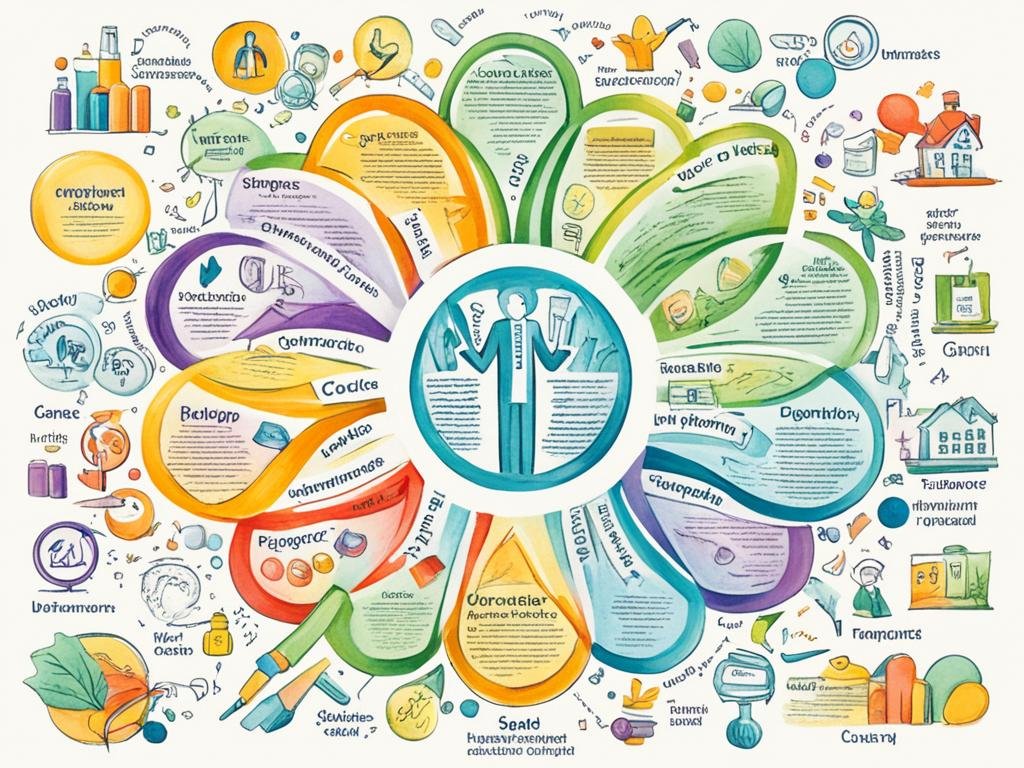Depression is a serious mood disorder. It affects your body, mood, and thoughts. People need to know depression is not from personal weakness. It’s not a flaw in your character either. Treatment is often required.
Once depression starts, there’s a risk of getting it again. Not treating it can make it come back more often and harder. Luckily, several treatments work for major depressive disorder. These include medicines, talking to someone (therapy), and changes in how we live. Working closely with your healthcare provider is key to tailoring a treatment plan. This plan should meet your specific needs.
Key Takeaways
- Depression is a serious mood disorder that requires professional treatment.
- Effective treatments for major depressive disorder include medications, therapy, and lifestyle changes.
- Medications like antidepressants can help ease depression symptoms.
- Talking to someone, using methods like cognitive behavioral therapy, can be very useful.
- Exercising and having a mindful life can help your professional treatment work better.
- It’s crucial to work closely with your healthcare provider. This step helps find the right treatment plan for you.
- With the right treatment, you can manage your depression and find relief.
Understanding Major Depressive Disorder
Major depressive disorder is a big problem in how you feel, think, and do things every day. It’s vital to spot the signs and symptoms. Knowing the types and features can help you get the right treatment.
What is major depressive disorder?
Major depressive disorder is a type of depression. It makes you feel really sad, hopeless, and stop enjoying things you used to like. This mood problem can hurt how well you live your life and your happiness.
Symptoms of major depressive disorder
You might feel very sad or worried a lot. You may not want to do things you normally enjoy. Your sleep and appetite might change. You may feel tired a lot, think you’re not as good as others, or wish you were dead. If you have five or more of these signs for two weeks, get help.
Types and features of major depression
There are different kinds of major depression. Some have unique features like being very anxious or having mood swings. Knowing your specific type can assist your doctor in creating the best plan to help you feel better.
Treatments for Major Depressive Disorder
Medicines and talking with a counselor can really help those feeling sad. Antidepressants are drugs that can make you feel better. They change how your brain’s chemicals work. It might take 4-8 weeks to see the full changes.
Medications for depression
Finding the best drug or mix of drugs might take time. Everyone reacts differently to these drugs. It’s key to talk a lot with your doctor. They might change your medicine or how much you take if needed.
Therapy for depression
Talking to a counselor can also make a big difference. They use ways like talking and thinking tips to help you feel better. This helps you handle problems and get along better with others. Using drugs and talking together is often the best way to beat depression.
Working closely with your doctor is very important. With staying hopeful and not giving up, you can get better and enjoy life more.
Choosing the Right Treatment
Many things matter when picking how to treat depression. These include how strong your symptoms are, any other health problems, what treatments you tried before, and what you prefer. Your health team looks at these factors in depression treatment to make your own personalized depression treatment plan. They might start with certain meds or talk therapies. Then, they watch how you do and change things if needed. The key is to find what works best for you to help with depression.
Your doctor will think about your depression’s details, like how bad the symptoms are, other health issues you might have, and what treatments you’ve had success with. They could start with a certain antidepressant or therapy and see how you respond. If things don’t get better enough, they’ll adjust the plan. This might mean trying a new medication or therapy to see if it helps more.
In the end, it’s all about finding the right personalized depression treatment that fits you well. Working closely with your health team helps. Together, you look at the factors in depression treatment and make a plan that truly meets your needs. This way, you’ve got a better shot at really improving your mental health for the long term.
The Treatment Process
Your healthcare provider will watch your progress closely during treatment. They might change the amount of your medicine or try something new if the first thing doesn’t help a lot. It’s key to keep up with your provider, even after you start feeling better. This keeps you from getting sick again and helps keep you moving forward. Regular check-ins, therapy, and taking care of yourself are important for dealing with major depressive disorder over time.
Monitoring Progress
Your healthcare provider will keep an eye on how you’re doing with your depression treatment. They’ll see if what you’re doing is making you better. This watching is important for making sure you’re getting the right help.
Adjusting Treatment
If what you started with isn’t helping enough, your provider might recommend trying something else. They could also change how much of a medicine you’re taking. This changing of treatment is needed to make sure you’re on the best path for you.
Continuing Care
It’s important to keep in touch with your healthcare provider, even if you’re feeling better. This means having regular times to talk, keeping up with therapy, and taking care of yourself. These steps help keep your good progress going and stop you from feeling bad again.
Coping Strategies
There are many ways to handle depression besides getting help from experts. Having a support network is key. This means being with friends, family, and others who cheer you up or help you with daily stuff. Talking to them, even when you don’t want to, can make you feel less alone.
Getting active can also lift your spirits. Doing things like walking, lifting weights, or dancing helps a lot. It’s just as good for you as taking drugs for feeling better. Try to work out for 30 minutes daily. Having someone to exercise with can make it more fun too. Also, getting a bit of sun each day can make you feel happier.
Eating well is also crucial. So is handling stress through things like meditation or slow breathing. Doing stuff you like – even if it feels hard at first – is important. Having a steady daily schedule and sleep routine makes a big difference too.
But remember, these tips are most helpful when combined with a doctor’s advice. Together with professional help, a strong friend and family network, and good lifestyle changes, you can take on depression and make life better.
Suicide and Self-harm
Depression can lead to suicide or self-harm thoughts. If you or a friend feels this way, seek help now. Contact your healthcare provider, call 988, or go to the nearest emergency room. These thoughts are a serious health issue. Quick help, support, and treatment can help you overcome.
When to seek immediate help
It’s crucial to see the signs of suicide. Signs include talking about death or wishing for it. It’s also finding ways to harm oneself. Others signs are feeling like there’s no point in life and feeling very painful. People may talk about not wanting to be a burden or use more alcohol or drugs. They may get anxious, angry, or change how they eat or sleep. If you see these signs, get help right away for suicide prevention, self-harm, and depression emergency support.
Thinking of suicide means you should get help fast. Help is a big step towards getting better. Call 988 for free, private help anytime. Or see your doctor, go to the emergency room, or call for help. With the right help, you can beat these thoughts and find hope again.
Treatments for major depressive disorder
Major depressive disorder is a big issue for some people. But it can be treated with the right mix of medicine, talk therapy, and life changes. It’s important to know what treatments are out there so you and your doctor can make a plan that works for you.
Medications
Doctors often give out antidepressants for this condition. There are many kinds, like Celexa and Prozac, which are called SSRI’s. Then there are SNRI’s like Cymbalta and Effexor XR.
It takes a few weeks for these to really help, so be patient. Your doctor will work with you closely during this time.
Therapy
Talking with a therapist can really make a difference. Types of therapy like CBT and interpersonal therapy help you change bad thinking and build better connections.
A therapist can be a great cheerleader and guide as you fight depression.
Lifestyle changes
Adding healthy habits to your life can help too. Regular exercise and eating well can boost your mood. So can finding ways to handle stress and activities you enjoy.
Don’t forget about having people around who care about you. They can make a big difference.
Together with your doctor, you can figure out the best mix of treatments for you. The right plan will bring some real relief from your depression.
Conclusion
Major depressive disorder is a serious condition but there are ways to treat it. Work with your doctor to try different treatments. This might include medications, therapy, and changing how you live. It will take some time to find what works best for you. But, by sticking with it, you can feel better.
Know that you are not alone. There is support to help you through this. With the right care and your hard work, you can get better.
The path to healing may be tough, but it is possible. Keep up with what your doctor recommends and try to stay positive. There are many ways to deal with this disorder. And soon, you can enjoy life again.




